Walking and golf go hand in hand. This fact was emphasized during lockdowns according to some sources. But an article in Golf Digest, one of the biggest golfing magazines, we need to divorce the romantic aspect of walking and focus on the more practical side of it. This sentiment is found across golfing websites that push the findings of Wolkodoff who found in a study that walking is better for health than using a cart. Walking essentially burns more calories than sitting in a cart. It is funny how we need science to clarify this rather intuitive fact. But this again emphasizes the divorce of poetry and science. In two excellent books, one on golf and another on walking, the simplistic act of walking is turned into something of poetic wonder and beauty.
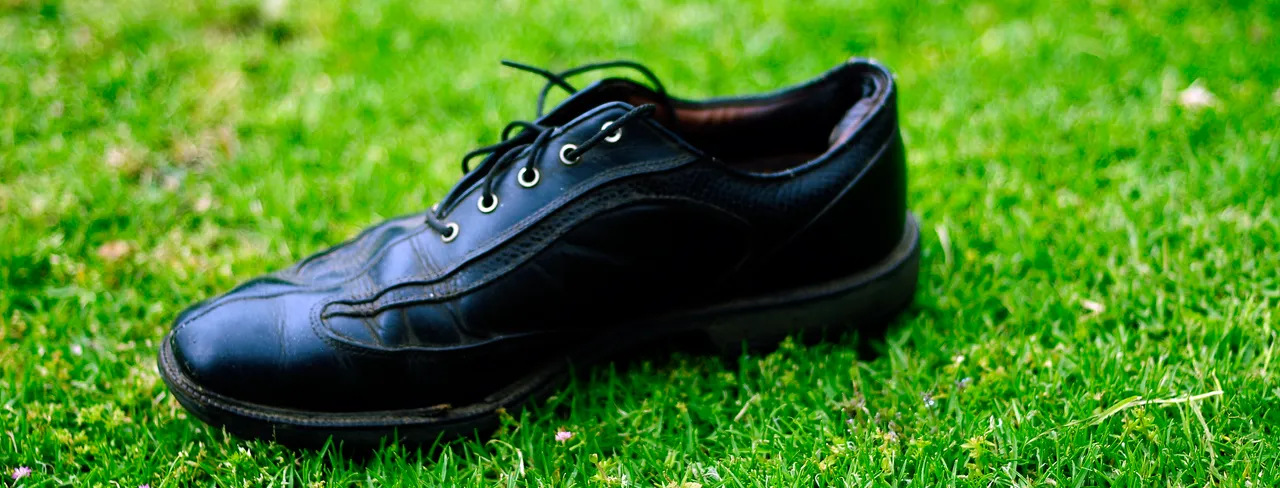
In this post, I want to explore this underexamined side of golfing and the accompanying act of walking. Firstly, I claim that with our reductionist focus on mostly the physical act and benefits of the act of walking, we miss one of the most important aspects of golfing: that walking is a part of the game. This points to a deeper problem: we tend to think of golf as just a game. This leads to the second part of this post. With the help of the two books, Preferred Lies and A Philosophy of Walking, I dig a little deeper into the philosophy and psychology of walking. Ultimately, I claim that golf and walking are intertwined and that our modern gaze on the sport essentially disrupts this beautiful and poetic act.
The Physical Benefits of Walking
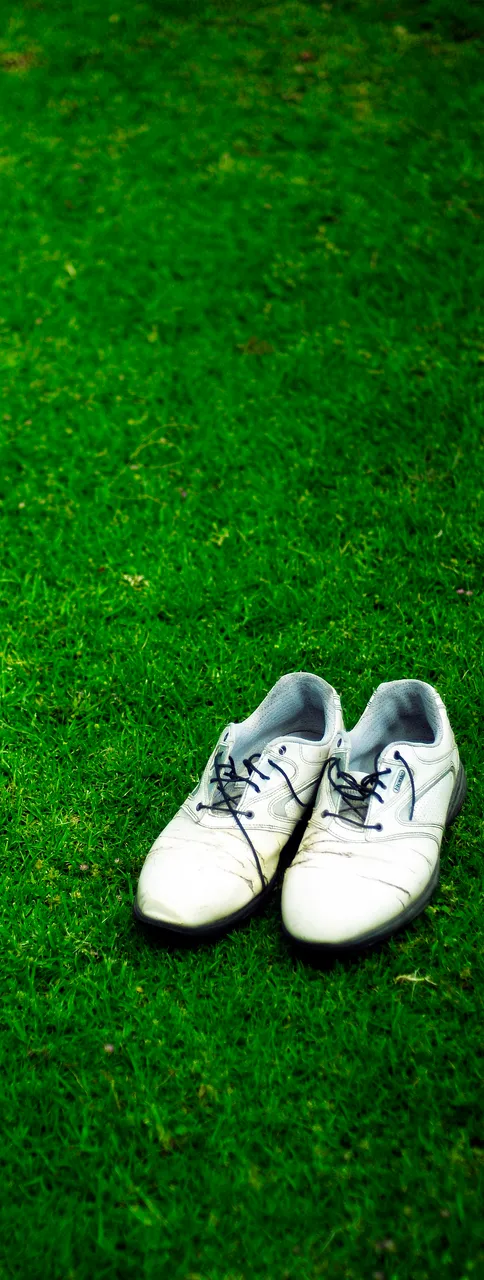
A lot of golfers, according to various golfing websites, have turned to walking again. The main reason: the physical exercise and health benefits that are gained from walking. Reporting on the findings of the study by Neil Wolkodoff, Bill Pennington writes that golfers who are unfit will eventually lose strokes. This is due to the golfer not having enough time, usually two minutes, to recover from the strenuous walking. Every golfer will know that walking uphill and getting to your ball and needing to play quickly ruins the shot. If you had the time to rest, you would not have scuffed or ruined the shot. The theory goes that if you are fit this resting period will shorten and the likelihood that you’d ruin the shot lessens. Every golfer knew this, but the work done by Wolkodoff just confirmed it in scientific terms.
Walking thus helps with getting you fit which in turn helps you gain shots on the course that you’d most likely lose due to the extended recovery time. Furthermore, the numbers are in. Walking the course burns x number of calories and this helps with the weekly number of calories you need to burn to maintain your weight, and so on. But in viewing golf and walking through this lens, aren’t we missing some of the more important aspects of golf? That is, aren’t we missing the psychological benefits of walking and being outside? I turn to two important books that help me with this reasoning, firstly, A Philosophy of Walking, and, secondly, Preferred Lies.
A Philosophy of Walking and the Importance of Freedom on the Golf Course
The opening lines of French philosopher Frédéric Gros’ A Philosophy of Walking read: “Walking is not a sport.” What is a sport? According to Gros, a sport is something that necessitates technique, rules, ethics, labor, constant improvement, and the unfortunate influx of brands and its sometimes-unnecessary products. He also compares a sport to war, the necessary enemy, and the desire to overcome. Walking, on the other hand, is not a sport. Instead, walking is “child’s play”, one foot in front of the other. Furthermore, he links walking with two “freedoms”. Firstly, walking takes you away from your immediate presence, the worries of your work, the necessary restrictions of routine, and your day-to-day life. Secondly, taking the break from the day-to-day life more seriously, we can go beyond it by renouncing it. Like certain sects of Buddhists, you start to walk in the woods, and this becomes your new day-to-day.
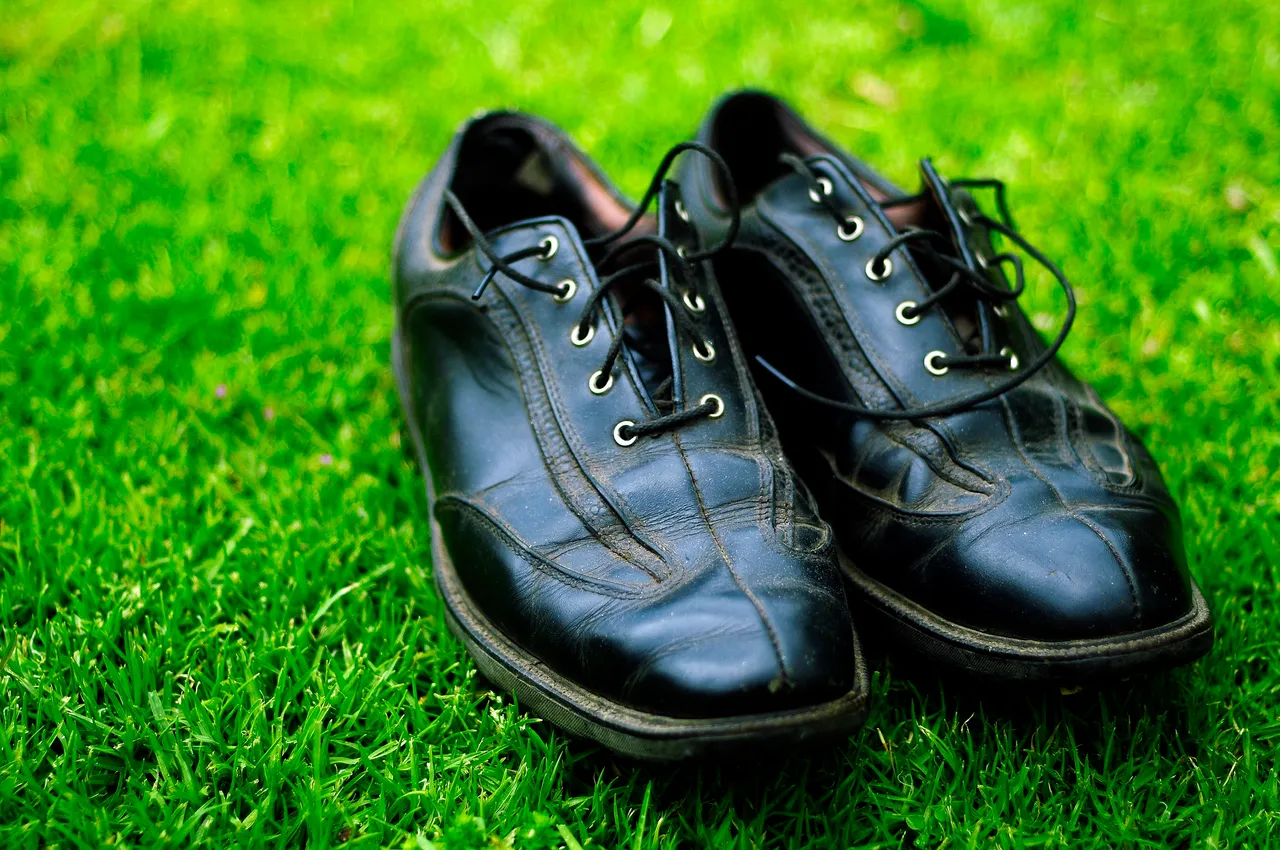
The most important aspect I find, in reading his work, is that walking is an act you appreciate for itself, it is not something you do to achieves something else. Yes, you can get fit, and you can get from point A to B, but this is not necessarily the walking the Gros is writing about. The walking he promotes, which becomes clearer throughout his book, is one that transforms the mind, one that helps you think, one that helps you philosophize. Various philosophers, Gros claims, only formulated their ideas when walking. Or, in other words, their walking helped them shape their ideas. If they were to walk for other reasons, like getting from point A to B, the same benefits would not have been unlocked. But what does this have to do with golf? Enter Preferred Lies by poet and writer Andrew Greig.
Preferred Lies and Golf as a Walking Sport
It is fitting that a poet wrote the most poetic book on golf. His only non-fiction work, Preferred Lies: A Journey to the Heart of Golf, reads like a long poem or eulogy to the wonders of golf. Or more appropriately, to golfing. Greig makes the rigid distinction between playing golf and golfing. This distinction is most apparent in an excellent and aptly named chapter Golf heaven, no caddy-carts admitted. He recollects a round of golf in which golf carts were mandatory. Ultimately, Greig reminisces and states that this was merely playing golf and he was bored out of his mind. He longed for walking, feeling the course with his feet and walking-presence, and exploring the course as it was intended. Greig writes:
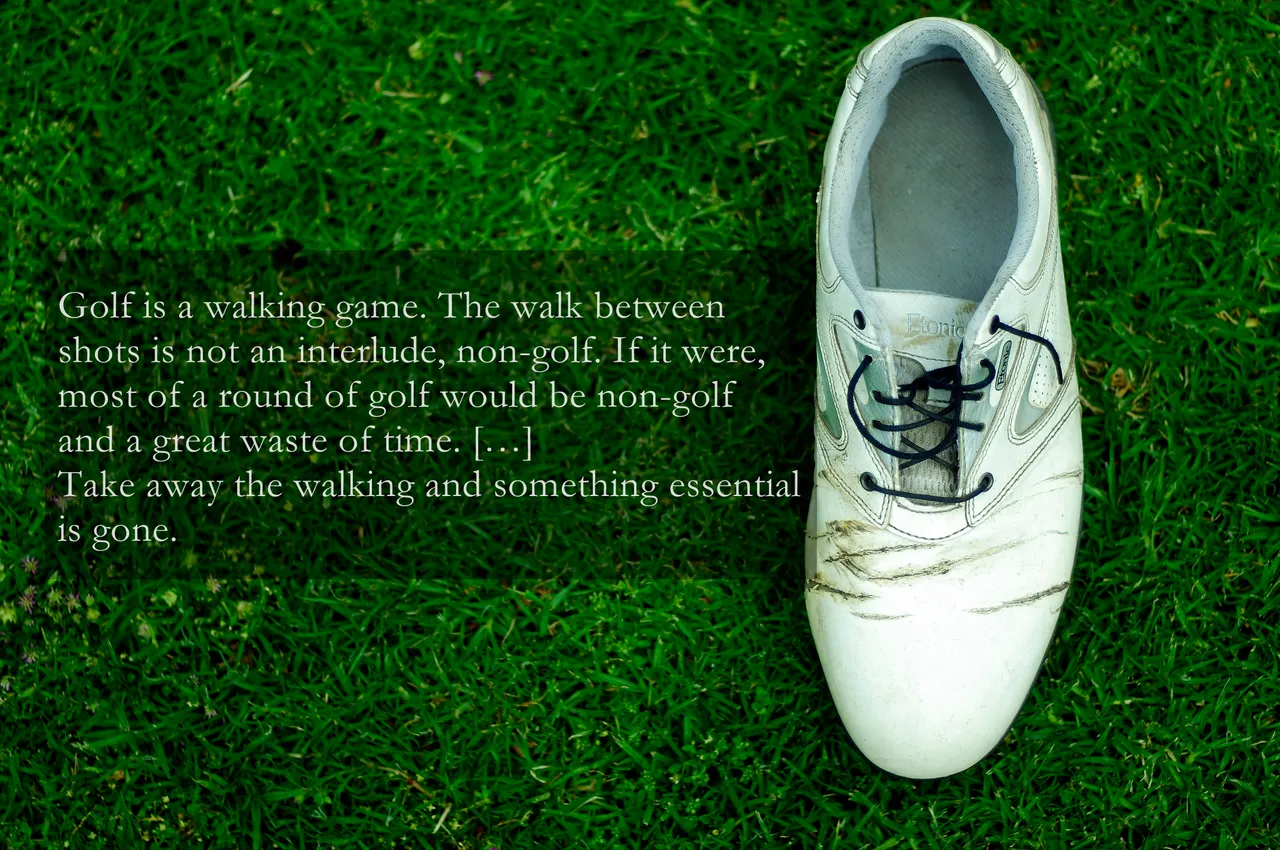
I find a clear similarity between Gros’ view of walking and Greig’s essentializing of walking in golf. Golfing is not a sport but rather a walk in nature, a contemplation of one’s presence in the world. To play golf, in contrast, is similar to walking to get from point A to point B. Golfing is thus not about getting better and overcoming the physical nature of golf, but to rather experience an almost holy moment alone or with friends. It is the experience of getting away from your day-to-day life, as Gros wrote, and to begin to “accept outcomes, [and] not [to] rail against them,” as Greig writes. Gros essentializes the goalless aspect of walking in a similar way as Greig essentializes the goalless aspect of golf. He writes that golf is not like war, nor like Buddhist meditations. It is merely golf. Walk to your ball and hit it. Walk on and on and on.
Philosophical and Psychological Reflections
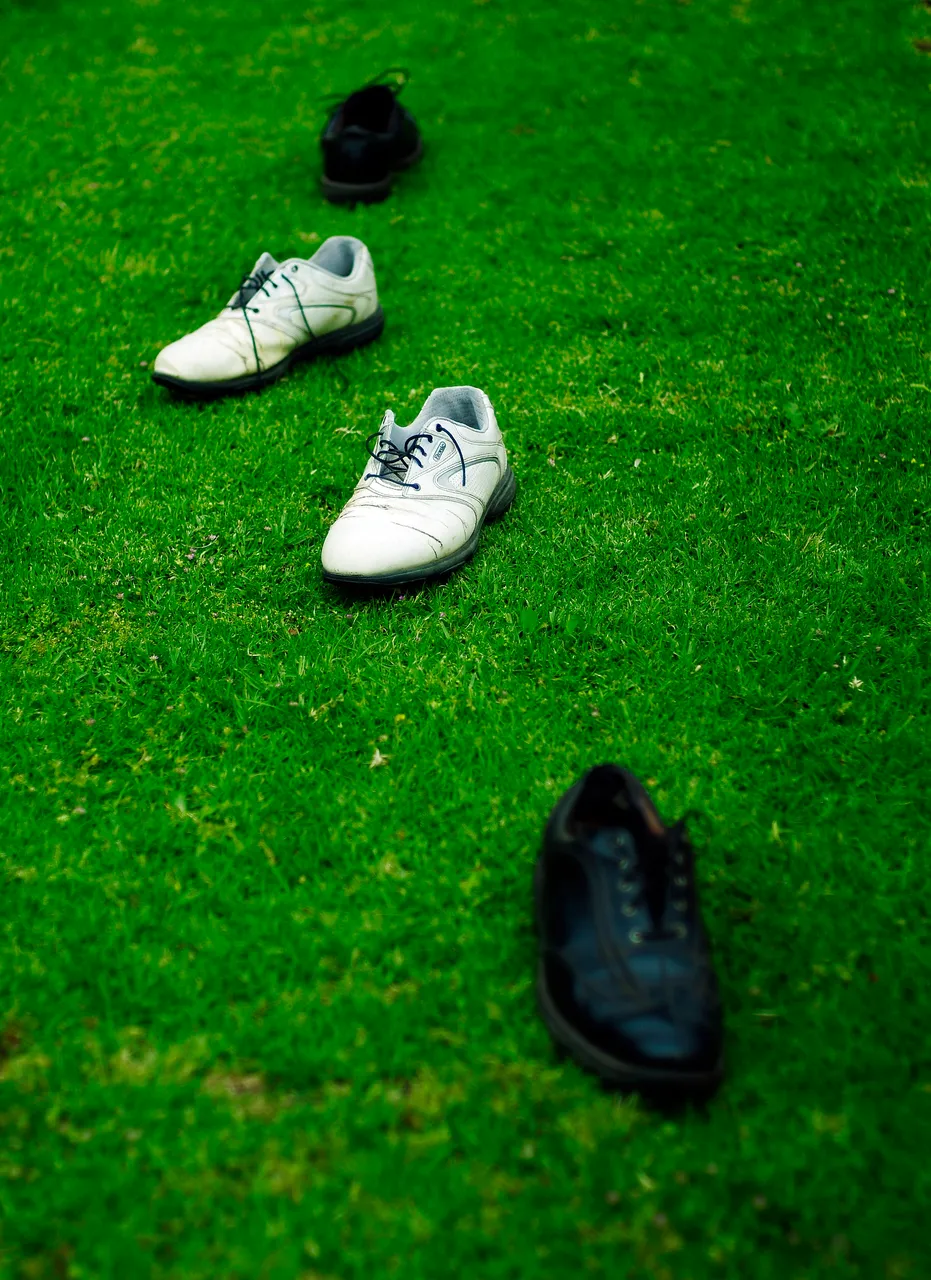
Golf to many is merely a sport. There is no difference between walking or driving in a cart. It is about getting the fewest amounts of shots, come what may, and in any way, you can get shots off of your score. Few would find the religious and poetic beauty in golf which Greig describes in his elegant writing. I want to attribute some of the loss of poetic beauty of golf to our modern mindset of overcoming nature, essentially the divorce of poetry and science. Science, in some sense, cannot fathom the unknown and goallessness in which the poetic revels and delights. In golf, we can take this very scientific approach to the game (think Bryson DeChambeau) and break the game down into its individual components. By doing this, the walk in between shots becomes what Greig writes as non-golf. It becomes a nuisance that we need to overcome so that I can hit the next shot. It becomes a part of the game you can also break down by, for one, getting fitter so that you can be livelier at your next shot. This is a cold and scientific way of approaching to play golf. This is not golfing.
Golfing is more poetic in nature. There are more unknowns than knowns, and this is what the golfer that golfs want. He or she doesn’t want to break the game down into its fundamental components to become better. Instead, this golfer would enjoy every part of the game, even the missed puts and scuffed chips. There are so many lessons one can learn in adopting this style of golfing. But to my mind, the most important element is the walking, the in-between-shots aspect of the game. In these moments, as Gros writes, we can have the opportunity to philosophize and think about life in a setting that is beyond or outside of our day-to-day lives. Golfing becomes thus an activity one enjoys for the sake of itself and not to get a better score or winning your partners. (This is not to claim that you cannot enjoy these things, I enjoy this aspect as well.)
Why do we walk? Why do you walk? The benefits of walking, I tried to show in this post, go beyond that of merely physical health. What most of these golfing websites miss is the mental health that accompanies walking. The time in-between-shots in which you can philosophize or in which you are taken away from the day-to-day. Walking is essentially falling but with your legs catching you just in time, but this reductionist or mechanical perspective of walking neglects the utter poetic moment of stabilization and the unknown element of surprise. Golf, similarly, can be viewed in the reductionist and mechanical perspective, that is, to play golf, or it can be left to chance and the unknown, that is, golfing.

*All the images are my own creation. The two books I mention can be sourced from bookshops or Amazon. The opinions and musings are also my own, please feel free to challenge them. Stay safe and happy golfing (sporting).
